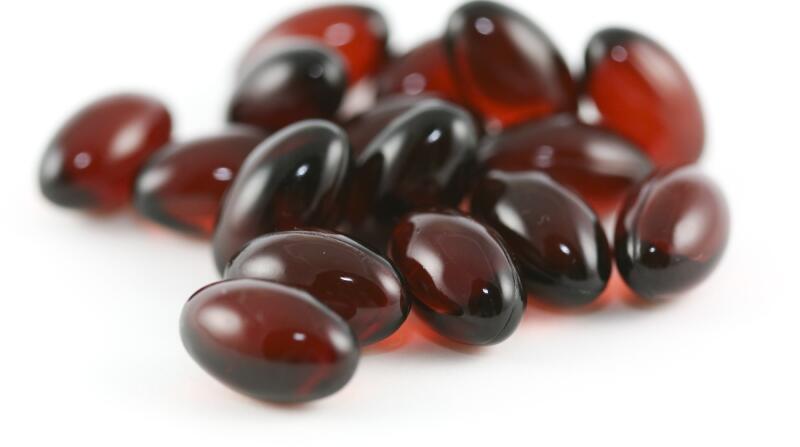7 Potential Benefits of Krill Oil

Medically Reviewed By William C. Lloyd III, MD, FACS
Written By Healthgrades Editorial Staff on August 28, 2021
-
 7 Potential Benefits of Krill OilKrill are tiny shrimp-like animals. They are an excellent source of omega-3 fatty acids, which your cells require to perform important functions. While krill oil may offer health benefits, you should not take krill oil if you are allergic to shellfish, or if you take blood thinners. Check with your doctor before taking any supplements, including krill oil.
7 Potential Benefits of Krill OilKrill are tiny shrimp-like animals. They are an excellent source of omega-3 fatty acids, which your cells require to perform important functions. While krill oil may offer health benefits, you should not take krill oil if you are allergic to shellfish, or if you take blood thinners. Check with your doctor before taking any supplements, including krill oil. -
 Krill’s Fatty Acids May Be Easier to AbsorbThe omega-3 fatty acids in krill oil are stored in a different biochemical form than fish oil. In krill oil, much of the fatty acid is stored as phospholipids. These have a simpler digestive process than other forms of fatty acids. Early research indicates your body can absorb the fatty acids in krill oil more easily than it can from fish oil or plants. However, more studies are necessary to find out if this affects krill oil's effectiveness.
Krill’s Fatty Acids May Be Easier to AbsorbThe omega-3 fatty acids in krill oil are stored in a different biochemical form than fish oil. In krill oil, much of the fatty acid is stored as phospholipids. These have a simpler digestive process than other forms of fatty acids. Early research indicates your body can absorb the fatty acids in krill oil more easily than it can from fish oil or plants. However, more studies are necessary to find out if this affects krill oil's effectiveness. -
-
 Krill Oil Has a Powerful AntioxidantKrill oil contains a very potent antioxidant called astaxanthin. Antioxidants protect your cells from damage from free radicals. Free radicals form when your body oxidizes the air that you breathe, breaks down foods, or encounters environmental hazards like smoke and radiation. Typically, antioxidants fight only one free radical at a time. But astaxanthin may be able to handle multiple free radicals at the same time.
Krill Oil Has a Powerful AntioxidantKrill oil contains a very potent antioxidant called astaxanthin. Antioxidants protect your cells from damage from free radicals. Free radicals form when your body oxidizes the air that you breathe, breaks down foods, or encounters environmental hazards like smoke and radiation. Typically, antioxidants fight only one free radical at a time. But astaxanthin may be able to handle multiple free radicals at the same time.
-
 Krill Oil May Boost Heart HealthLike fish oil, krill oil contains fatty acids that can help reduce cholesterol and triglycerides in your blood and improve circulation. One seven-week study of 113 volunteers found the heart benefits of krill oil were similar to those of fatty fish, but more research is necessary.
Krill Oil May Boost Heart HealthLike fish oil, krill oil contains fatty acids that can help reduce cholesterol and triglycerides in your blood and improve circulation. One seven-week study of 113 volunteers found the heart benefits of krill oil were similar to those of fatty fish, but more research is necessary.
-
 Krill Oil May Ease PMS SymptomsA small study by Canadian researchers found that krill oil can help women manage the emotional symptoms of premenstrual syndrome and painful periods. Some study participants took krill oil for three menstrual cycles; others took fish oil. The women taking krill oil reported needing fewer painkillers than those who took fish oil. However, some experts described the study as poorly designed.
Krill Oil May Ease PMS SymptomsA small study by Canadian researchers found that krill oil can help women manage the emotional symptoms of premenstrual syndrome and painful periods. Some study participants took krill oil for three menstrual cycles; others took fish oil. The women taking krill oil reported needing fewer painkillers than those who took fish oil. However, some experts described the study as poorly designed.
-
 Krill Oil May Lessen Arthritis PainSome research shows that krill oil may reduce the inflammation of arthritis. A study of 90 people reported in the Journal of the American College of Nutrition found that krill oil reduced arthritis pain and stiffness within one to two weeks. However, there's no specific evidence that krill oil is superior to fish oil for relieving arthritis symptoms.
Krill Oil May Lessen Arthritis PainSome research shows that krill oil may reduce the inflammation of arthritis. A study of 90 people reported in the Journal of the American College of Nutrition found that krill oil reduced arthritis pain and stiffness within one to two weeks. However, there's no specific evidence that krill oil is superior to fish oil for relieving arthritis symptoms.
-
-
 Krill Oil May Boost Your BrainSome researchers have a theory that low levels of omega-3s can cause cognitive decline, or a loss of memory and thinking skills. So, they've looked at whether krill oil supplements can improve brain function. Early results in animals say yes. Researchers in Norway found that rats given krill oil supplements performed better on skills tests. They also found that krill oil produced effects similar to those of antidepressants.
Krill Oil May Boost Your BrainSome researchers have a theory that low levels of omega-3s can cause cognitive decline, or a loss of memory and thinking skills. So, they've looked at whether krill oil supplements can improve brain function. Early results in animals say yes. Researchers in Norway found that rats given krill oil supplements performed better on skills tests. They also found that krill oil produced effects similar to those of antidepressants.
-
 Krill Oil Might Reduce the Risk for Skin CancerMakers of krill supplements promote krill oil’s ability to improve skin texture, reduce wrinkles, ease the itchy red plaques of psoriasis, strengthen nails, and make hair appear thicker. No credible studies back these claims, but there may be one benefit. Krill eat algae, and a study in the Journal of Agricultural and Food Chemistry reported that astaxanthin found in algae protected rats from skin cancer.
Krill Oil Might Reduce the Risk for Skin CancerMakers of krill supplements promote krill oil’s ability to improve skin texture, reduce wrinkles, ease the itchy red plaques of psoriasis, strengthen nails, and make hair appear thicker. No credible studies back these claims, but there may be one benefit. Krill eat algae, and a study in the Journal of Agricultural and Food Chemistry reported that astaxanthin found in algae protected rats from skin cancer.
7 Potential Benefits of Krill Oil



























